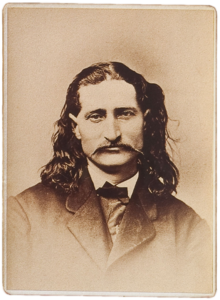Wild Bill Hickock
| "Wild Bill" Hickok | |
|---|---|

James Butler "Wild Bill" Hickok, photograph date unknown
|
|
| Born |
James Butler Hickok May 27, 1837 Homer, LaSalle County, Illinois (present-day Troy Grove) |
| Died | August 2, 1876 (aged 39) Deadwood, Lawrence County, Dakota Territory (present-day Deadwood, South Dakota) |
| Cause of death | Murder by shooting |
| Resting place | Mount Moriah Cemetery, Deadwood, Dakota Territory |
| Other names | James B. Hickok, J.B. Hickok, Shanghai Bill, William Hickok, William Haycock |
| Occupation | farmer, vigilante, drover, teamster, wagon master, stagecoach driver, soldier, spy, scout, detective, lawman, gunfighter, gambler, showman, performer, actor |
| Parent(s) | William Alonzo Hickok and Polly Butler |
| Signature | |
James Butler "Wild Bill" Hickok (May 27, 1837 – August 2, 1876), also "J. B. Hickok" for his signature name, was a folk hero of the American Old West, known for his work across the frontier as a drover, wagon master, soldier, spy, scout, lawman, gunfighter, gambler, showman, and actor. He earned a great deal of notoriety in his own time, much of it bolstered by the many outlandish - often fabricated - tales he told about his life. Some contemporary reports of his exploits are known to be fictitious but, along with his own stories, remain the basis for much of his fame and reputation.
Hickok was born and raised on a farm in northern Illinois, at a time when lawlessness and vigilante activity was rampant because of the influence of the "Banditti of the Prairie". Hickok was drawn to this ruffian lifestyle and headed west at age 18 as a fugitive from justice, working as a stagecoach driver and later as a lawman in the frontier territories of Kansas and Nebraska. He fought and spied for the Union Army during the American Civil War and gained publicity after the war as a scout, marksman, actor, and professional gambler. Over the course of his life, he was involved in several notable shootouts.
In 1876, Hickok was shot from behind and killed while playing poker in a saloon in Deadwood, Dakota Territory (present-day South Dakota), by Jack McCall, an unsuccessful gambler. The hand of cards which he supposedly held at the time of his death (including the ace of spades, the ace of clubs, the eight of spades, and the eight of clubs) has become known as the dead man's hand.
...
Wikipedia
